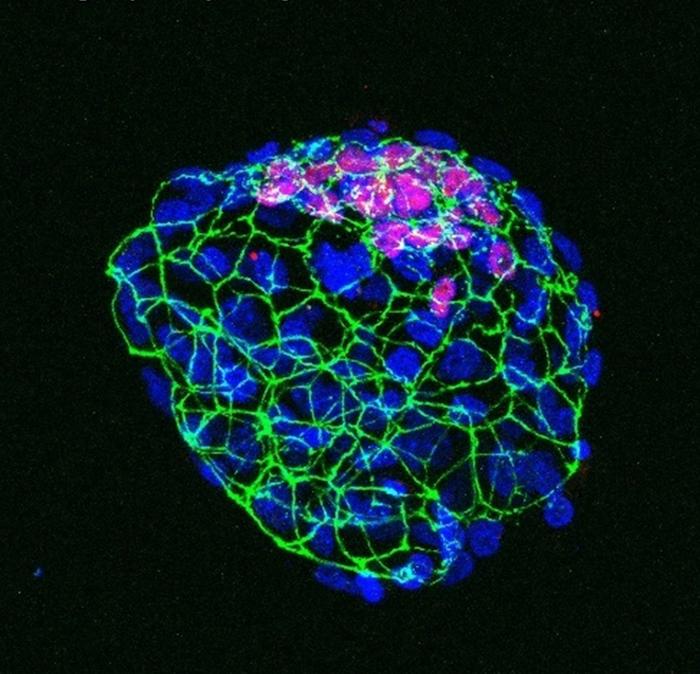It’s challenging to sustain a pregnancy when food is short, or conditions are otherwise tough. That’s why many mammalian embryos can postpone their growth to get through periods of environmental stress and then re-enter development when conditions improve. This stalling of development is known as embryonic diapause, and understanding the mechanisms behind it might help improve infertility treatments, such as embryo freezing. Now, researchers at the Center for Excellence in Brain Science and Intelligence Technology, the Chinese Academy of Sciences in Shanghai, China, have discovered how nutrient depletion is sensed by embryos growing in hungry mouse mums to induce diapause. They publish their study in the journal Development on 11 April 2024.

Credit: Jiajia Ye
It’s challenging to sustain a pregnancy when food is short, or conditions are otherwise tough. That’s why many mammalian embryos can postpone their growth to get through periods of environmental stress and then re-enter development when conditions improve. This stalling of development is known as embryonic diapause, and understanding the mechanisms behind it might help improve infertility treatments, such as embryo freezing. Now, researchers at the Center for Excellence in Brain Science and Intelligence Technology, the Chinese Academy of Sciences in Shanghai, China, have discovered how nutrient depletion is sensed by embryos growing in hungry mouse mums to induce diapause. They publish their study in the journal Development on 11 April 2024.
Lack of food is a known trigger of embryonic diapause, but it has not been clear how nutrient depletion in the mother’s diet is sensed by the embryo. “Seasonal starvation is one of the universal environmental stresses in nature,” explained Professor Qiang Sun, who led the study. “However, the regulatory process of diapause in early-stage embryos is not fully understood. So, we decided to examine whether nutrient deprivation induces embryonic diapause.”
By comparing hungry and well-fed pregnant mice, the team discovered that embryos in the hungry mice did not implant into the uterus and their growth paused at an early timepoint, when the embryo comprises a hollow ball of cells called the blastocyst. These embryos remained viable and could start developing again when transplanted into a well-fed mother.
To work out which nutrients were important to induce diapause, the researchers grew early-stage mouse embryos in dishes that contained different nutrients. They found that embryos grown in dishes lacking protein or carbohydrates paused their development, whereas the embryos exposed to normal nutrient levels did not stall and kept on developing. The scientists then went on to reveal that nutrient sensors in the embryo can detect drops in protein or carbohydrate levels, which triggers the entry into diapause.
The finding that embryos grown without protein or carbohydrates can pause their development means that they can survive longer in the lab. In the future, this finding might lead to improvements in fertility treatments, which currently include approaches such as embryo freezing. “We think our study can inspire the development of new methods for human embryo preservation,” said Professor Sun. “Embryo cryopreservation is a widely used approach, but there is still no consensus on when cryopreserved embryos can be thawed and transferred into the uterus. Many clinical studies have shown that traditional frozen embryo transfer can increase the risk of problems during pregnancy. Therefore, it is necessary to develop alternative methods to preserve embryos.”
Studies focusing on diapause may even have long-term implications for cancer treatments. “Dormant cancer cells which persist after chemotherapy resemble the diapaused embryos,” said Professor Sun. “Consequently, we hypothesize that delving into the mechanism of diapause may have positive implications for cancer treatment and decreasing the chances of relapse.”
###
IF REPORTING THIS STORY, PLEASE MENTION DEVELOPMENT AS THE SOURCE AND, IF REPORTING ONLINE, PLEASE CARRY A LINK TO: https://journals.biologists.com/dev/article-lookup/DOI/10.1242/dev.202091
IMAGE CAPTION: A mouse embryo (blastocyst) that has paused its development due to nutrient depletion. Image credit: Jiajia Ye.
REFERENCE: Jiajia Ye, Yuting Xu, Qi Ren, Lu liu and Qiang Sun (2024). Nutrient deprivation induces mouse embryonic diapause mediated by Gator1 and Tsc2. Development, 151, dev202091 doi: 10.1242/dev.202091
The story is COPYRIGHTED. Therefore, advance permission is required before any and every reproduction of each article in full. Please contact: [email protected].
THIS ARTICLE IS EMBARGOED UNTIL Thursday 11th April 2024, 17:00 HRS EDT (22:00 HRS BST)
Journal
Development
DOI
10.1242/dev.202091
Method of Research
Experimental study
Subject of Research
Animals
Article Title
Nutrient deprivation induces mouse embryonic diapause mediated by Gator1 and Tsc2
Article Publication Date
11-Apr-2024




